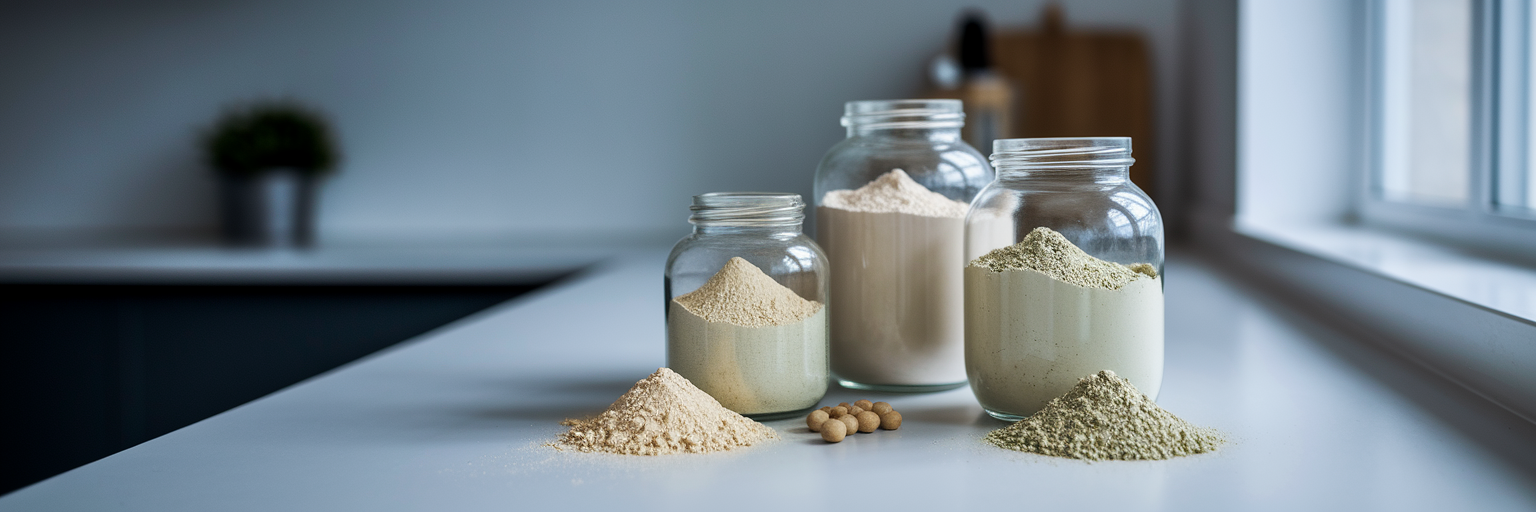Why Your Protein Shake Might Be Causing Discomfort
It’s incredibly frustrating, isn’t it? You blend up a vegan protein shake to do something good for your body, only to be met with bloating, gas, or an upset stomach. If this sounds familiar, please know you’re not alone. This is a super common experience, and it absolutely does not mean you have to give up on the benefits of plant-based protein.
The good news is that the problem usually isn’t “vegan protein” itself. More often, the discomfort comes from specific ingredients, processing methods, or hidden additives found in many popular powders. Think of this as your official invitation to become a savvy label detective. We’re here to help you learn exactly what to look for and what to avoid.
By the end of this guide, you’ll feel confident walking down the supplement aisle, ready to choose a vegan protein for sensitive stomachs that fuels your body without any of the uncomfortable side effects. Let’s get started.
Prioritizing Clean Ingredients for Better Digestion

Finding a protein powder that agrees with you starts with the ingredient list. Instead of focusing on what to cut out, let's first look at what you want to see on the label. A high-quality, gentle formula is built on a foundation of simple, recognizable ingredients.
What 'Clean Ingredients' Really Means
A clean ingredient protein powder is one with a short, understandable ingredient list. The fewer unpronounceable items, the better. Look for powders that use a single source of protein, such as organic pea, brown rice, or hemp. These are known for being gentle on the digestive system. Many brands use complex "proprietary blends," which can make it difficult to identify what might be causing irritation.
Thankfully, modern processing has made plant proteins more digestible than ever. As noted in a recent review by Bon Appétit, advanced techniques can remove anti-nutrients from legumes, making them an easy to digest plant protein source without the common digestive drawbacks.
The Power of Third-Party Certifications
Labels like USDA Organic and Non-GMO Project Verified are more than just marketing buzzwords. They are your assurance of purity. A USDA Organic seal means the ingredients were grown without synthetic pesticides or fertilizers, which can be irritating to a sensitive system. The Non-GMO Project Verified seal confirms the product is free from genetically modified organisms.
These certifications provide peace of mind, ensuring that what you’re putting into your body is as clean as possible. When you're comparing some of the best protein powders on the market, these seals are a reliable indicator of quality.
Navigating Common Allergens and Additives
Now that you know what to look for, let's talk about what to avoid. The search for a plant protein without bloating often comes down to spotting and sidestepping a few common culprits that are frequently added to protein powders for flavor, texture, or preservation.
Here are the main ingredients to watch out for:
- Common Allergens: Soy and gluten are frequent triggers for those with sensitivities. Even if you don't have a diagnosed allergy, these can sometimes cause low-grade inflammation and discomfort.
- Artificial Sweeteners: Ingredients like sucralose, aspartame, and acesulfame potassium can disrupt the delicate balance of your gut bacteria and lead to digestive issues.
- Sugar Alcohols: Often ending in "-ol" (like erythritol, xylitol, and sorbitol), these sweeteners are poorly absorbed by the small intestine. They can ferment in your gut, leading to gas and bloating.
- Gums & Thickeners: Xanthan gum, guar gum, and carrageenan are used to create a smoother texture, but they can also slow digestion and cause a heavy, uncomfortable feeling for some people.
A helpful tip is to scan the very end of the ingredient list, as this is where many of these additives are often hidden. The good news is that more and more brands are creating "free-from" formulas, making it much easier to find an allergen free protein powder. Finding a powder that skips these additives is key, like options formulated with natural sweeteners and no gums.
| Ingredient Category | Examples | Potential Effect on Sensitive Stomachs |
|---|---|---|
| Artificial Sweeteners | Sucralose, Aspartame | Can alter gut microbiome and cause digestive upset for some. |
| Sugar Alcohols | Erythritol, Xylitol, Sorbitol | Poorly absorbed; can ferment in the large intestine, causing gas and bloating. |
| Gums & Thickeners | Xanthan Gum, Guar Gum | Can slow digestion and cause a 'heavy' feeling or discomfort in sensitive individuals. |
| Common Allergens | Soy, Gluten | Can trigger allergic reactions or sensitivities, leading to inflammation and discomfort. |
This table summarizes common additives and allergens to watch for. Checking ingredient labels for these items can help you avoid common triggers for digestive discomfort.
The Surprising Role of Texture in Digestibility

Here’s something you might not have considered: the physical texture of your protein powder can directly affect how it feels in your stomach. It’s not just about the ingredients, but also how the powder itself is made. A gritty, clumpy shake isn't just unpleasant to drink; it can also be a sign that the powder is not finely milled, making it physically harder for your body to break down and absorb.
As highlighted in a review by Health.com, the texture of a protein powder plays a key role, with finely milled options being less likely to cause bloating. The ideal powder should feel silky and fine to the touch and dissolve almost instantly in liquid. This superior texture is a hallmark of an easy to digest plant protein.
You can perform a simple "mixability test" at home. Shake one serving of powder with plain water in a clear bottle. Does it mix smoothly, or are there clumps and a sandy residue at the bottom? A smooth blend is a great indicator of quality. Premium brands invest in advanced milling processes to achieve this, which also reduces the need for the irritating gums and thickeners we just discussed. Plus, a smooth powder is much more versatile for making delicious and easy vegan protein recipes.
Exploring Powders with Digestive Health Boosters
Looking ahead, one of the most exciting trends for the best vegan protein powder 2025 is the inclusion of ingredients that actively support your digestive health. These formulas go beyond just avoiding irritants and instead add beneficial components to help your gut thrive. Think of them as a proactive approach to digestive wellness.
Here are a few key boosters to look for:
- Digestive Enzymes: These are "little helpers," like protease and amylase, that assist your body in breaking down proteins, fats, and carbohydrates more efficiently. This can ease the digestive load and reduce the chances of discomfort.
- Probiotics: These are the "good bacteria" that live in your gut. Adding them to your protein powder helps support a healthy gut microbiome, which is the foundation for overall digestive wellness.
- Prebiotics: If probiotics are the good bacteria, prebiotics are their food. Ingredients like inulin or acacia fiber help the beneficial bacteria in your gut flourish.
While these boosters are a fantastic bonus, it’s important to maintain a balanced perspective. They can’t make up for a low-quality base protein filled with additives. Your foundation should always be a clean ingredient protein powder. Consider these digestive aids the finishing touch on an already excellent formula.
Your Simple Checklist for a Happy Gut
We've covered a lot of ground, so let's bring it all together into a simple checklist you can use the next time you're shopping. Keep this handy on your phone to make choosing the right powder a breeze.
Your Gut-Friendly Protein Checklist:
- Start with the Source: Look for single-ingredient proteins like organic pea, brown rice, or hemp.
- Scan for Saboteurs: Flip to the ingredient list and check for artificial sweeteners, sugar alcohols, and extra gums.
- Feel the Texture: Choose powders known for being finely milled and mixing smoothly without clumps.
- Look for the Helpers: Consider formulas with added digestive enzymes or probiotics as a valuable bonus.
You're now equipped to find the perfect vegan protein for sensitive stomachs! If this guide was helpful, feel free to share it with a friend who could use it.
Ready to find your match? Explore our collection of clean, easy-to-digest vegan proteins.



